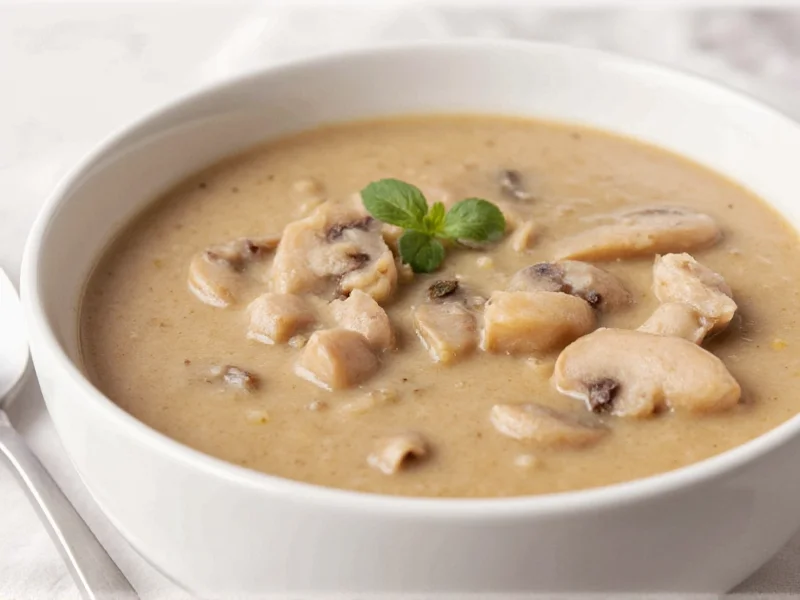If your dog accidentally consumed cream of mushroom soup, monitor for symptoms like vomiting, diarrhea, lethargy, or abdominal pain. Contact your veterinarian immediately if your dog ate a significant amount, especially if the soup contained onions or garlic.
Why Cream of Mushroom Soup Is Dangerous for Dogs
Cream of mushroom soup poses several specific health risks to dogs that responsible pet owners should understand. Let's examine each problematic ingredient and its potential effects on canine health.
Onions and Garlic: The Most Immediate Danger
Most commercial cream of mushroom soups contain onion powder, garlic powder, or both. These ingredients belong to the Allium family, which is highly toxic to dogs. Even small amounts can cause hemolytic anemia by damaging red blood cells. Symptoms may not appear immediately but can develop within 24-72 hours.
The toxic dose is approximately 15-30 grams of onion per kilogram of body weight, but some dogs show sensitivity to much smaller amounts. A single serving of soup typically contains enough onion powder to potentially harm a medium-sized dog.
Mushroom Content: Unknown Risks
While cultivated mushrooms like button or cremini mushrooms are generally safe for dogs in small amounts, commercial soups often use mushroom extracts or powders with unknown composition. Some wild mushrooms are extremely toxic, and commercial products don't always specify mushroom varieties. The cooking process doesn't eliminate potential toxins from certain mushroom species.
| Common Cream of Mushroom Soup Ingredients | Risk Level for Dogs | Potential Health Effects |
|---|---|---|
| Onion/Garlic Powder | Severe | Hemolytic anemia, weakness, rapid breathing |
| Cream/Butter | Moderate | Pancreatitis, vomiting, diarrhea |
| Wheat Flour | Low-Moderate | Digestive upset in sensitive dogs |
| Unknown Mushroom Varieties | Variable | Potential liver/kidney damage from toxic species |
| Seasonings (salt, pepper) | Low | Dehydration, electrolyte imbalance |
High Fat Content: Pancreatitis Risk
Cream of mushroom soup contains significant amounts of butter, cream, and oil. Dogs have difficulty processing high-fat foods, which can trigger acute pancreatitis—a painful and potentially life-threatening inflammation of the pancreas. Symptoms include severe abdominal pain, vomiting, diarrhea, and loss of appetite. Certain breeds like Miniature Schnauzers, Cocker Spaniels, and Yorkshire Terriers are particularly susceptible.
Dairy Sensitivity
Many adult dogs are lactose intolerant to some degree. The cream in this soup can cause gastrointestinal distress including gas, bloating, and diarrhea. While not as immediately dangerous as onion toxicity, it causes unnecessary discomfort for your pet.
What to Do If Your Dog Ate Cream of Mushroom Soup
If your dog consumed cream of mushroom soup, follow these steps:
- Assess the amount consumed - A single lick poses minimal risk, but eating a bowl requires immediate attention
- Check ingredients - If onions or garlic were present, contact your vet immediately
- Monitor for symptoms - Watch for vomiting, diarrhea, lethargy, or abdominal pain
- Call your veterinarian - Provide details about how much was consumed and the soup's ingredients
- Do not induce vomiting without veterinary guidance - This could cause additional complications
Safer Alternatives for Dogs
If you want to share human food with your dog, consider these safer alternatives:
- Plain cooked mushrooms (button or cremini) in very small amounts
- Plain pumpkin (not pumpkin pie filling)
- Plain cooked chicken or turkey
- Plain cooked sweet potato
- Plain green beans or carrots
Always introduce new foods gradually and in small quantities. When in doubt about whether dogs can eat cream of mushroom soup ingredients, consult your veterinarian before offering any human food to your pet.
When to Seek Emergency Veterinary Care
Contact your veterinarian immediately if your dog shows any of these symptoms after consuming cream of mushroom soup:
- Repeated vomiting or diarrhea
- Weakness or collapse
- Rapid breathing or heart rate
- Pale gums (sign of anemia)
- Abdominal pain (whining, reluctance to move)
- Loss of appetite lasting more than 12 hours
Remember that symptoms of onion toxicity may not appear for several days, so even if your dog seems fine initially, contact your vet if they consumed a significant amount containing onions or garlic.











 浙公网安备
33010002000092号
浙公网安备
33010002000092号 浙B2-20120091-4
浙B2-20120091-4